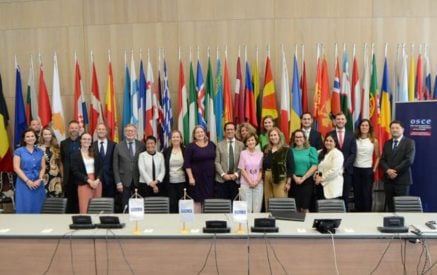YEREVAN – The 2024 findings from the USAID-funded Research on Media Consumption and Freedom of Expression in Armenia have been released. This is the second consecutive year of the study, which was launched in 2023 to provide ongoing insights into the country’s media landscape.
The research is conducted under the USAID-funded Media Program in Armenia, implemented by Internews in partnership with the Media Initiatives Center, Yerevan Press Club, and Zinc Network.
The Media Consumption and Freedom of Expression annual research explores how Armenians access, trust, and share information, as well as the challenges impacting media freedom.
The research uses a mixed-methods approach, combining a nationally representative survey of 1,106 respondents aged 18 and above, along with eight focus group discussions with men, women, youth, and urban and rural populations.
Read also
The study covers six main domains:
Media Consumption Habits
Trust in Media
Consumer Needs and Demands
Media Literacy and Ethical Standards
Ethical Standards
Perceptions of Freedom of Expression
The USAID-funded Media Program in Armenia is a 5-year activity with an estimated $15 million budget. Through its innovative approach, the program strives to enhance journalistic standards, catalyze the financial viability of public interest media, and foster the enabling environment for a society protected from disinformation.
USAID is dedicated to promoting democratic values, fostering open media environments, and
championing freedom of expression in Armenia.
Snapshot of “Media Consumption and Freedom of Expression in Armenia” Research
2024 Findings
Armenian TV channels, news websites, and blogs/vlogs/podcasts are the most widely consumed media sources, with Russian TV channels and news websites following closely behind. Social networks are the main sources for social and political news, followed by television.
53% of respondents consider the news presented by Armenian media to be reliable (compared to 49% in 2023), while 41% believe the news is unbiased and objective, slightly down from 44% in 2023.
24% of respondents are willing to pay or subscribe to Armenian media for access to quality content, up from
17% in 2023. Among those willing to contribute in 2024, 72% are prepared to pay up to 4,000 AMD (approximately 10 USD) per month, a slight decrease from around 80% in 2023.
66% of respondents are satisfied with the media՛s coverage of topics that are important to them, up from 56% last year.
Education, healthcare, well-being, and security remain popular topics, with over 90% of respondents
considering them important. In contrast, politics is of least interest, with only 50% of respondents
considering it important.
The data on media literacy shows a gap between perceived and actual skills. Although many respondents
believe they can distinguish facts from opinions and detect manipulative media, only 31% identified the
correct option exclusively when asked to identify fact-based versus opinion-based statements. This is
slightly less than the 39% last year and reflects the discrepancy between confidence and actual media
literacy skills as well as changes to answer options in this year’s study. 18% can recognize questionable
information and verify facts based on a skills test question, while 15% can create media content.
44% of respondents are satisfied with the ethics and professionalism of Armenian journalists, which is
consistent with last year’s results.
Over the years, awareness of the Media Ethics Observatory has grown, increasing from 5% in 2021 to 15%
in 2024. However, the percentage of respondents willing to submit a complaint to the Observatory has
remained unchanged at 27-31%.
Perceptions of freedom of speech have remained largely unchanged since 2023. In 2024, 75% of
respondents view the freedom of speech for the people of Armenia as free, and 72% view it as free for the
media. However, 40% of respondents in 2024 disagree with the statement asserting that they can freely
participate in peaceful protests or organized political events, compared to 25% in 2023.
80% of respondents believe that hate speech is a significant problem in Armenia, slightly down from 84%
last year. The majority (66%) identify the online space as the most common venue for hate speech.
This research is made possible by the generous support of the American people through the United States Agency for International Development
(USAID).
The contents are the responsibility of Internews Network and do not necessarily reflect the views of USAID or the United States Government

























































